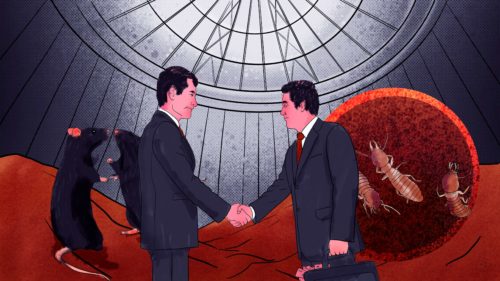Videos of binge-eating humans banned in China, now people are forcing their pets to do it
As part of China’s national campaign to curb food waste, people are now forbidden to share videos of themselves consuming absurd amounts of food on social media. But some pet owners have taken advantage of the situation to popularize a disturbing genre of viral videos: animals overeating.

As part of China’s national campaign to curb food waste, people are now forbidden to share videos of themselves consuming absurd amounts of food on social media, a fad called chibo (吃播 chībō, “eating broadcast”), often known by its Korean name, mukbang. But as the appetite for binge-eating content continues to exist, some pet owners in China have taken advantage of the situation to popularize a disturbing genre of viral videos: animals overeating.
On Chinese video-sharing platforms such as Douyin and Kuaishou, clips of adorable animals enjoying food have long been a popular feature. But it was not until after China’s recent crackdown on chibo that a large number of people decided to get into the competitive business of pet videos based on forced binge-eating.
In one video, two dogs are challenged to consume 38 different kinds of snacks and eight drinks in one setting. After the binge-eating session, one of them ends up lying on its back, seemingly unable to digest properly. In another video, a dog can be seen crying while being forced to eat a bowl of chili paste.

In addition to food meant for humans, many of these unsettling videos feature pets being fed an excessive amount of raw meat. In one video, rabbit blood is added to regular dog kibble for the purpose of graphic sensation.
While most animals featured in these videos do not appear to be as “happy” as their owners claim in captions, such content has a decent size audience, with some clips racking up hundreds of thousands of likes on platforms.

But a backlash against these animal binge-eating videos could be underway. Earlier this week, several Chinese news outlets published articles (in Chinese) and videos (in Chinese) describing the phenomenon and condemning the creators of such animal cruelty videos.
The coverage quickly sparked urgent appeals from animal lovers, who called for video-sharing platforms to take action against videos that include or incite abuse toward animals. “Not everyone who owns dogs actually loves dogs. Some of them probably love money more. Abusing dogs for internet fame is absolutely deplorable,” a Weibo user wrote (in Chinese).
So far, neither Douyin or Kuaishou has responded to the public outrage.
While public awareness about animal welfare and protection has grown substantially in China in the past couple of years, there are currently no nationwide laws that explicitly prohibit the mistreatment of animals. As a result of China’s lack of legal action against animal cruelty, videos of people torturing pets or stray animals often spread in an unchecked manner on social media, and many of them are up for sale among people who share the same gruesome interests.






